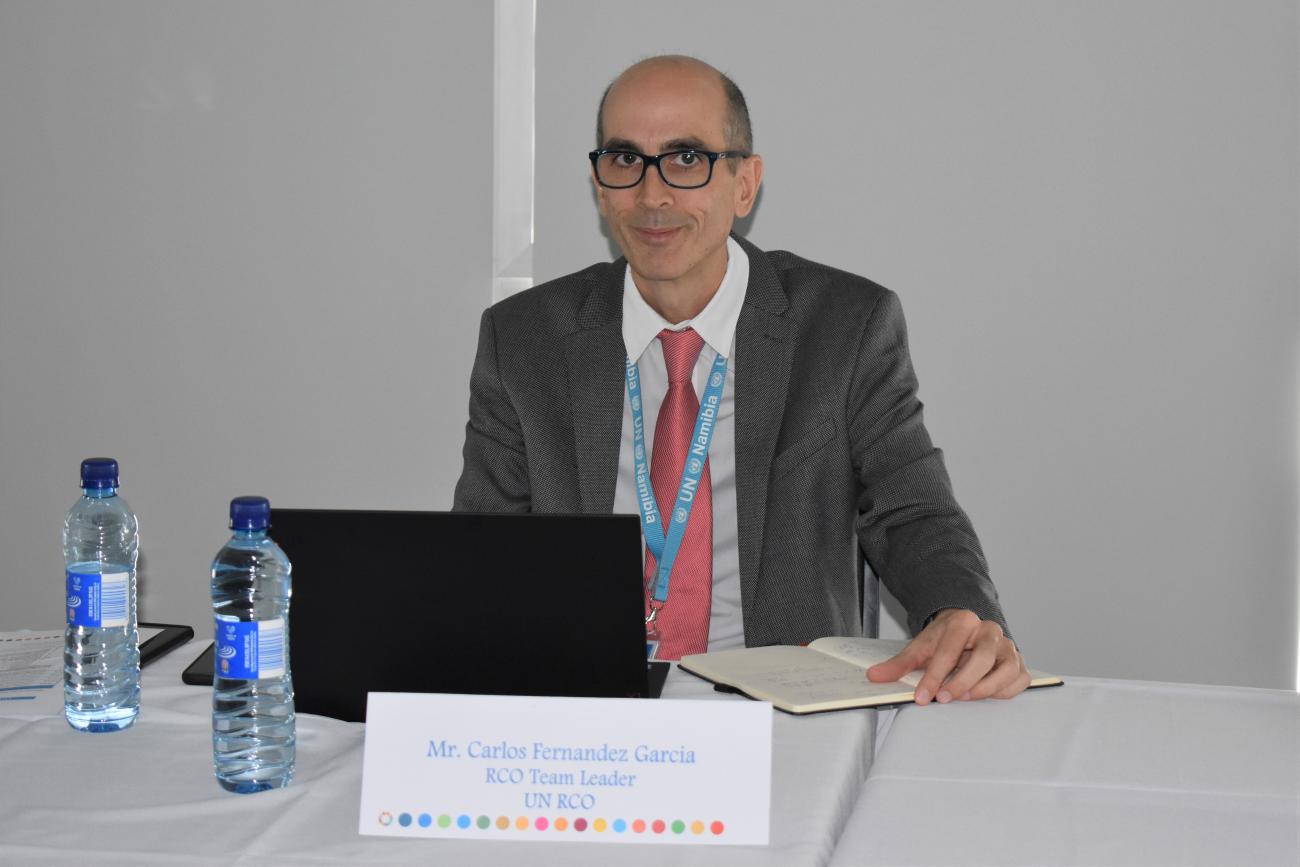In the face of COVID-19, political dialogue and solidarity might help overcome uncertainty

by: Carlos J. Fernandez Garcia, RCO NAMIBIA
All Head of States expound that the fight against COVID-19 has become a critical war for humankind since World War II, taking into account its economic fallout as the main crisis since 1929. Uncertainty and fear looms everywhere as some countries ease lockdown measures and despite the negative connotation of uncertainties, it might bring in an opportunity for political compacts and global solidarity if talented statesmen and stateswomen develop strategic visions and decision-making tactics which will merge political and economic factors across the board.
In Namibia, the government and its counterparts are working to alleviate uncertainties that circulate around the novel coronavirus. The aftermath is anticipated to be one that will cost the country an arm and a leg, but the spirit of Ubuntu prevails during these harsh times through humanity and assurance. Political dialogues and solidarity are becoming the song of emancipation and this might be the remedy to overcome the lack of certainty.
Conventionally, wars have brave heroes who sacrifice their lives for others, and this war is not different. These heroes are acclaimed every day from balconies, backyards, and social networks across continents.
Two main features can be used to depict these humanitarians. First of, they belong to the invisible and silent working sectors that form the ranks of the middle class, which is the cohesive backbone of majority of the societies. Secondly, they are most likely to suffer the greatest toll of the pandemic in terms of casualties and economic loss, together with those who are most vulnerable in our societies. Without doubt, all the sectors of developed or developing countries are being affected. We ought to stand together in solidarity as Europe or the besieged United Kingdom stood during the Second World War.
During and after World War II, the United Kingdom remains a good exemplar of how uncertainty and political compact across the board can work out in a beneficial way for the society, economy and the democratic foundations of State. Amidst the wartime coalition government led by the conservative Prime Minister W. Churchill, the parliament published towards the end of 1942 a report titled “Social Insurance and Allied Services” (known as the Beveridge Report), which would become the blueprint for the modern welfare state in the United Kingdom. The report was released at the darkest hours of the war, where population across all social sectors were severely affected. The Beveridge Report aimed at creating a social insurance and protection system from the cradle to the grave, which would fight the five giants (Want, Disease, Ignorance, Squalor and Idleness) on the road of reconstruction. More importantly, the report gave hope to the population for a collective breaking ground for reconstruction while enduring the scourge of the war.
The Beveridge Report was radical for the United Kingdom, which had based its social and economic policies in liberal principles and laissez-faire. After the report was publicized, a poll was carried through and it revealed an overwhelming support of 95% by the population to the report’s recommendations. In this context, it was with little surprise that the discussion raised opposing views between labor and conservatives who were coalition government partners. Despite the urge to apply the recommendations of the report immediately, Prime Minister Churchill postponed its implementation to the end of the war and committed to the principles of a national insurance system in a limited way. As a result, uncertainty had been reduced with the main political forces committed in different degrees to set up a national social security system after the election that would take place in 1945. There was a glimpse of hope for society to keep fighting and as some of the legislation and policies passed by the new Labor government after the war, the National Health Service Act (1948) set up a universal health service for the population.
Ensuing the many labor or conservative governments, the NHS and the welfare system survived as a pillar of the UK social policies. Today, Prime Minister Boris Johnson and the top figures of his cabinet have requested UK citizens to stay home and protect the NHS, which is the main bulwark against COVID-19. Around the sphere of the world, the battlefield for the war and the places where the coronavirus can be brought to a halt, are the hospitals of national health systems. Social security and national health systems have been victims of budget austerity or underfunding, either in the developed countries, which experience the highest level of inequality since the Second World War, or in developing countries, where universal health coverage remains a challenge even for many Upper-Middle Income Countries (UMICs) with high inequality rates.
The United Nations Secretary General, Antonio Guterres, has pointed out that the world needs solidarity to fight the virus, as no country can be declared safe if there are countries where the virus is not controlled. Approximately half of the population, worldwide, does not have access to the full coverage of basic health services whilst 55 % of the population have inadequate or no social protection coverage. According to the figures for 2014/2015, Namibia had 26% of the population who reaped the goodness of a public or private employee medical insurance, while 64% of the population relied on the public health expenditure and the remaining 10% on the out-of-pocket money, which poses a great vulnerability in the phase of a pandemic such as COVID-19.
The novel coronavirus is leveling societies, as either wealthy or poor, based on how they are affected by the virus and by confinement. People will most likely be treated, cared for and served by heroes of the national health systems and other public and private basic services.
In addition, the welfare state in the form of social security systems or social protection floors, are the main solidarity tool for societies across the world in this time of crisis. We are continuously reminded of our collective responsibility to stay home in order to avoid our coping mechanisms from collapsing against the virus.
A third of the world population is in confinement and with the outbreak figures still skyrocketing in many countries, people need to be hopeful of the future in regard to overcoming the social and economic impacts as a result of COVID-19. This outbreak comes posterior to a international financial crisis, rising levels of inequality in large parts of the world, and expanding populist political movements; therefore, it is not surprising that some social scientists or opinion leaders anticipate that the aftermath of this pandemic may rattle the foundations of the society and economy. In these uncertain times, it is vital to look for cohesiveness across the political aisle to defeat the virus, and stateswomen and statesmen need to be bold and radical as it was written in the Beveridge Report.
The time to look for new paradigms and move away from orthodoxy is now.
The United Nations has called for the first global fiscal stimulus in history of a double-digit global gross domestic product. This package will inject required resources into economies to resuscitate economic and social confidence in the future. The resuscitation must be an opportunity for countries, such as Namibia, to achieve transformation into more equal societies by further promoting higher added value productive chains, decent employment, as well as further investing in the people, public health, and education sectors. This can avail the opportunity for global leaders to invest in solidarity among nations to fight inequality and bridge the gap between the rich and poor while improving safety and resilience worldwide. By doing so, preparedness mechanisms for coping with future outbreaks should be in place while resuming the track for advancing the 2030 Agenda and the SDGs.
The alternative to radical action is a patching work, as the post-COVID-19 scenario unfolds featuring fragile international trade system, weakened economies, encroaching unemployment, and poverty; while growing populism continues to erode mutual toleration and institutional foundations in the political arena of many countries around the world. The divisive and eroding political impact of COVID-19 must be carefully weighed upon when pondering on the transformative effect of socio-economic responses and recovery plans for the post-COVID-19 world. As history manifested prior, political uncertainty and financial strain might not be unsurmountable obstacles but they are triggers for innovation and stability.
Written by







